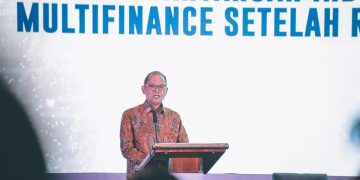By Fathan Subchi, Deputy Chairman of Comissioner IX The House of Representative of The Republic of Indonesia
Jakarta – The draft law on Development and Strengthening of the Financial Sector has been decided to become law today, 15 December 2022. In the final text that was made into the Development and Strengthening of the Financial Sector law, there were changes from the draft of Development and Strengthening of the Financial Sector bill dated 20 September 2022 previously. One of them is the method of the Financial Sector Stability Committee in preventing and handling financial system crises. Handling this crisis is an important point considering that the risk of a crisis occurring now and in the future is getting higher.
The experience of overcoming a crisis by rescuing a failing bank has left a trauma, so that if there is no clear legal protection, it is feared that it will make the authority doubt to make decisions in times of crisis.
Financial Sector Stability Committee consists of the Minister of Finance as a coordinator concurrently a member, whose members are the Governor of Bank Indonesia (BI), Chair of the Board of Commissioners of the Financial Services Authority (OJK), Chair of the Board of Commissioners of the Deposit Insurance Corporation (LPS). The authority of the Financial Sector Stability Committee has changed from the existing law, namely Law Number 9 of 2016 which has 11 authorities to 9 authorities as stated in Article 6 of the Development and Strengthening of the Financial Sector Law.
The positions of Bank Indonesia, Financial Services Authority and Deposit Insurance Corporation are still independent according to the expectations of many people, and prohibit members of political parties from becoming governors or deputy governors or the board of commissioners. However, there has been a development, in which the duties of the Deposit Insurance Corporation have been expanded to handle the insurance sector, including carrying out policy guarantees. So is the Financial Services Authority, which has added the Chair of the Chief Executive who oversees technological innovation in the financial sector, digital financial assets and crypto assets.
The duties of the Financial Sector Stability Committee are getting tighter. Not only dealing with financial system crises, but Financial Sector Stability Committee will also handle systemic problems of financial service institutions in conditions of normal financial system stability as well as in crisis conditions.
In Article 5 it is explained that the Financial Sector Stability Committee is in charge with coordinating the monitoring and maintenance of financial system stability, handling financial system crises, and coordinating the handling of systemic bank problems, both under normal financial system stability and financial system crisis conditions. The most important thing is that the Financial Sector Stability Committee was assigned he was assigned to handle banks and insurance companies that experienced systemic problems. Starting from financial system stability in normal conditions and financial system crises. In the Development and Strengthening of the Financial Sector Law, there is no mention of the term failed bank or a bank experiencing financial difficulties and endangering its business continuity, and changed to ‘bank in resolution’. The same goes for insurance companies.
In accordance with public aspirations that Financial Sector Stability Committee members such as Financial Services Authority, Bank Indonesia and Deposit Insurance Corporation, still have independence. That’s why the government and House of Representatives agree with the ban on candidates for members of the Bank Indonesia governor’s board, Financial Services Authority commissioners, and Deposit Insurance Corporation board of commissioners as administrators and or members of political parties. In other words, the Development and Strengthening of the Financial Sector Law strongly supports all the efforts shown to increase the ability to prevent problems in the banking and financial sectors and ensure that these prevention efforts are mitigative in nature and avoid moral hazard.
With the independence of its members, the Financial Sector Stability Committee is expected to be able to make the best decisions in handling crises and interventions. This is because successful handling and resolution of financial crises must be carried out independently and free from conflicts of interest from certain parties. With decisions taken independently, the coordination steps that are determined to prevent a financial system crisis are the best decisions to be recommended to the president in order to decide on steps to handle them, including recommendations on the implementation and termination of the banking restructuring program.
What needs to be observed is that the Financial Sector Stability Committee decision-making is carried out in Financial Sector Stability Committee meetings by deliberation for consensus where all Financial Sector Stability Committee members have equal voting rights. This is because in terms of decision making based on a majority vote and if the results are balanced, the Minister of Finance as the coordinator of the Financial Sector Stability Committee has a veto right to make decisions on behalf of the Financial Sector Stability Committee.
Meanwhile, the Minister of Finance is part of the government whose appointment is different from the election of the Governor of Bank Indonesia or the Chairman of the Board of Commissioners of Financial Services Authority and Deposit Insurance Corporation which is carried out in a fit and proper manner. It should be noted that the Development and Strengthening of the Financial Sector Law which will strengthen the authority and institutional governance of the financial sector will not apply for one or two government periods.
Of course, we believe in the capacity of the Minister of Finance like Sri Mulyani in leading and coordinating the handling of the financial crisis. However, the Development and Strengthening of the Financial Sector Law will be in effect for a long time and as economists often say, the financial crisis interval will be getting tighter. If crisis prevention and handling tend to be determined by the Minister of Finance, the question is what if the Minister of Finance is not as good as Sri Mulyani?(*)






